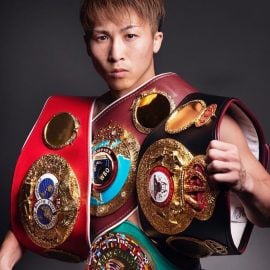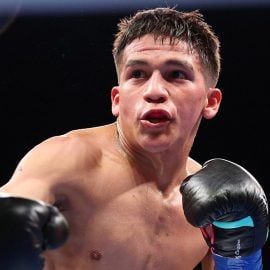Brian Mitchell, the ultimate road warrior, is happy to be home
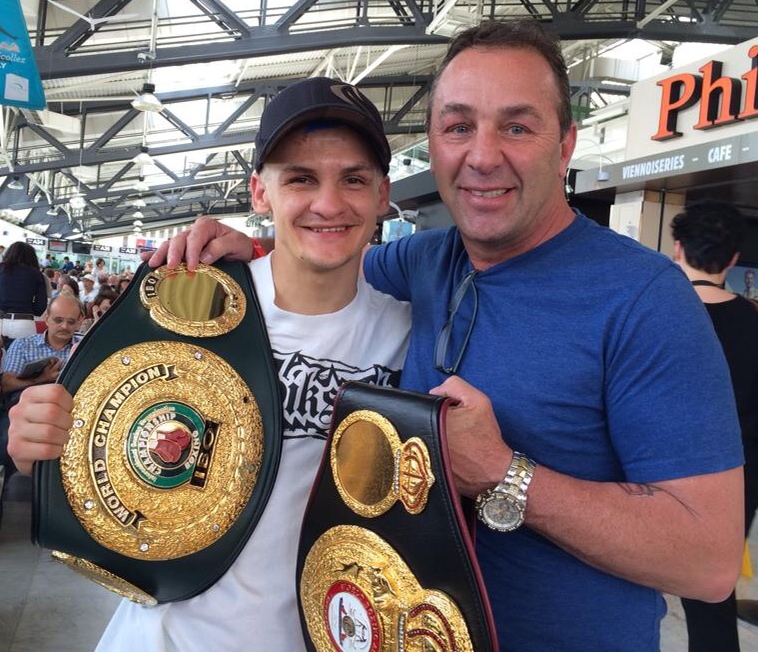
“Please let him be cool…”
This, I am told, is a predominant thought experienced by most people before meeting an idol from their youth. Those exact thoughts were running through my mind, while waiting in my rental car outside an upmarket townhouse complex in the Johannesburg suburb of Bassonia.
I was early for my interview with the former IBF and WBA junior lightweight titleholder Brian Mitchell. If you grew up in South Africa during the late-1980s and early-’90s and the name doesn’t ring a bell, then you must have spent much of your time in a coma. Mitchell was – and still is – a big deal.
He became the WBA and linear 130-pound champion by stopping Wilfredo Gomez’s conqueror, Alfredo Layne, in the 10th round on a memorable night at Sun City in September of 1986. Shortly thereafter, the sports boycott of South Africa in protest to the country’s Apartheid policies came into full effect and Mitchell was left out in the cold. A compromise solution was reached in which he was allowed to keep his title but his belt-winning effort against Layne was to be his final world title fight on South African soil.
He went on the road and made a division record 12 defenses of his WBA title, a five-year long journey that took him to far flung corners of the world, from Panama to Spain, from Italy to the U.K. and eventually to the States, always defending in the challengers’ backyards. His last title defense was a unification fight with IBF beltholder Tony Lopez in front of Lopez’s wildly partisan fans in Sacramento’s Arco Arena in March of 1991. That fight ended in a split draw and Mitchell had to give up his WBA title to procure the rematch. The second time around, he left no doubt and schooled Lopez for his signature win and the IBF belt. He promptly retired as undefeated champion, came back as a junior welterweight three years later to score two more wins and then retired for good in 1995 with an impressive 45-1-3 (with 21 knockouts) mark.
I look at my watch. It is time. I drive up to the gate and the security guard’s face lights up when I tell him who I am visiting. “Oh, Mr. Brian! His house is just over there,” he gestures as he lets me in. The garage door opens and I am greeted by Mitchell’s girlfriend Charlene and two yapping chihauhuas, strangely out of place among all the boxing memorabilia. She knows who I’m here for, “He’s right behind you.” I turn around and the familiar face of the Super Sport boxing commentating team greets me warmly as he gets out of his car. He looks fit and well, only the scar tissue around the eyes giving away the previous profession that made him famous. “My pitbulls,” he laughs while the little dogs scurry about his feet, as Charlene takes her leave.
These days he is a public speaker, auctioneer for various charities, golfing aficionado and, of course, boxing commentator.
We go upstairs and I see his IBF belt mounted on the wall along with a photo of him taken after his win over Tony Lopez. “So are you guys still mad at each other or are you OK now?” I ask, remembering the heated build-up to the Lopez rematch. “No, we’re fine now; that was long ago,” he answers with a chuckle and regales me with a story from 2009. Mitchell was in Canastota, New York, to be inducted into the International Boxing Hall of Fame, still the only South African fighter to have achieved that honor. “So I get there and here is this guy sitting there. He looks just like Tony Lopez but the only thing is he is way too big. I walk over and tell him, ‘You look just like Tony Lopez.’ He laughs and says, ‘I am Tony Lopez!’ Turns out he started bodybuilding. There he was, 18 years later at my induction ceremony.”
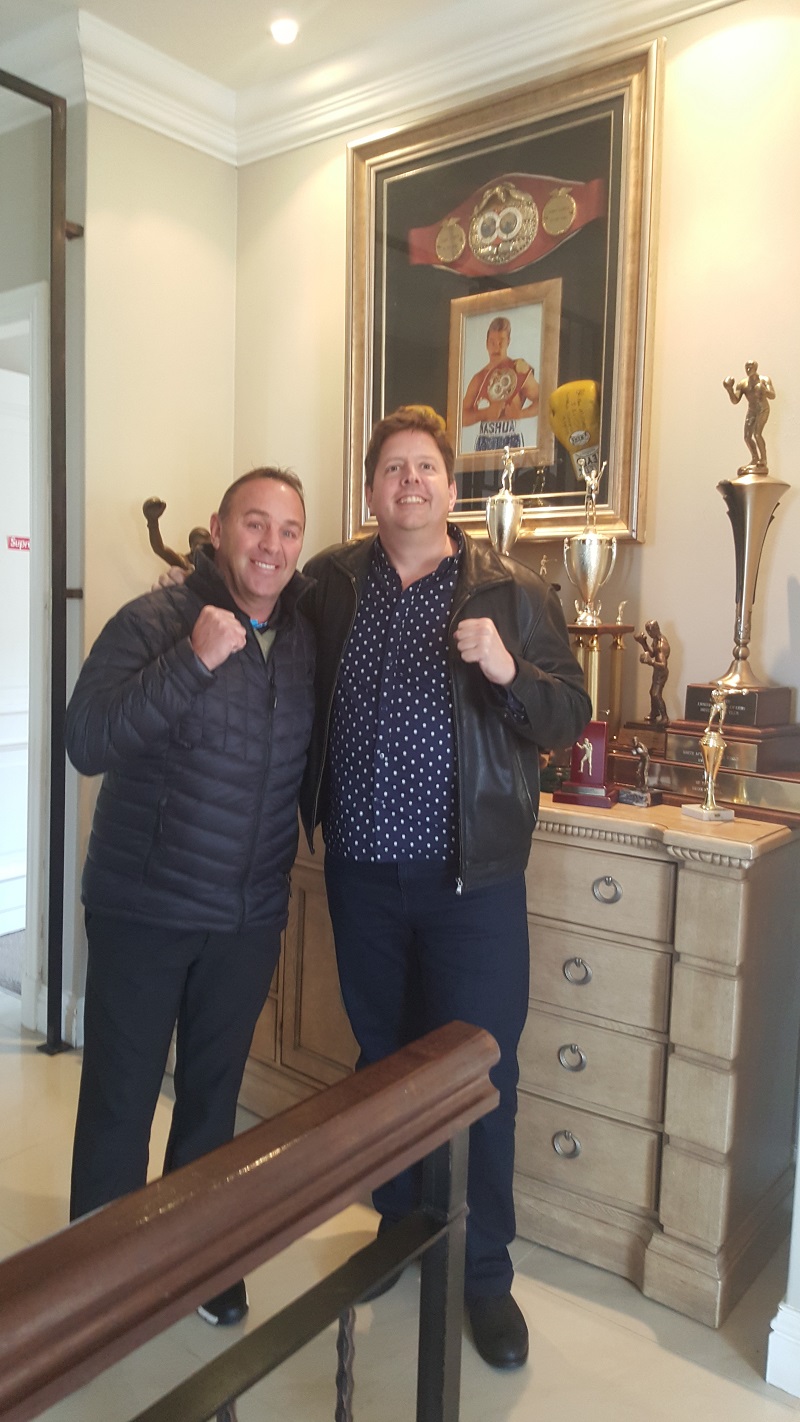
Former two-time junior lightweight titleholder Brian Mitchell (left) and Droeks Malan
The landing on top of the stairs is another Hall of Fame of sorts. Mitchell’s old WBA belt is also on display, as well as his robe and trunks from his last fight and myriad belts, trophies and photos. We sit down in his study and his domestic worker Patience promptly delivers some coffee. We talk about the state of the game in South Africa. The standard of amateur boxing is something that worries him. ”It is not their fault. Youngsters have too many distractions,” said Mitchell. “They are not as hungry to succeed as we were in the ’80s. We didn’t have cell phones and all these other things. We just went to the boxing gym and that was our social life.” South African boxing has experienced a recent resurgence with WBO bantamweight titlist Zolani Tete, WBA and The Ring Magazine junior flyweight champion Hekkie Budler and rejuvenated IBF flyweight boss Moruti Mthalane leading the way. I ask him if he sees any potential world champions joining them in the future. “Tommy Oosthuizen has the talent,” he opines before we both agree that Oosthuizen will need to conquer his demons outside of the ring. “I like Kevin Lerena. He has done well but I think he is going to have a hard time beating the big names of the division. Thulani Mbenge has potential but he still needs to prove himself.”
We go back to the start of his career. I ask Mitchell what he thinks about today’s tendency of fighters going through trainers. His own switches between trainers were mostly about managerial connections, as most trainers in South Africa also act as managers. “I loved Willie Toweel (his first trainer). Thing is, he got me a lot of national title fights but he couldn’t get me the big international fights that I wanted. I then went to see Rodney Berman (head of Golden Gloves, South African promotional powerhouse) and asked him to promote me. He told me to let my manager come see him but he did not work with Willie. Then Harold (Volbrecht, two-time world welterweight title challenger) told me to go see Carlos Jacamo, that he could get me fights. Carlos insisted on training me as well, so I had to leave Willie. I felt bad but I had to do it for my career.” MItchell became champion but eventually fell out with Jacamo after the latter took out a promotional license in Italy. “He was sitting on two chairs and didn’t have my best interest at heart.” Golden Gloves finally approached him to take over as his promoter, which led to him splitting with Jacamo. For the first time, he was in control of his team. “Harold then became my trainer and I asked them for an international trainer as well. I told them I’d love to work with Murphy Griffith. I met him in the States. He was training (Ray) “Boom Boom” Mancini. I sparred many rounds with Mancini and I really loved the way Murphy worked. He then became my co-trainer.” His advice to the youngsters? “Everything happened at the perfect time for me. Everyone is different. What I will say is that you have to think of the business side of your career.”
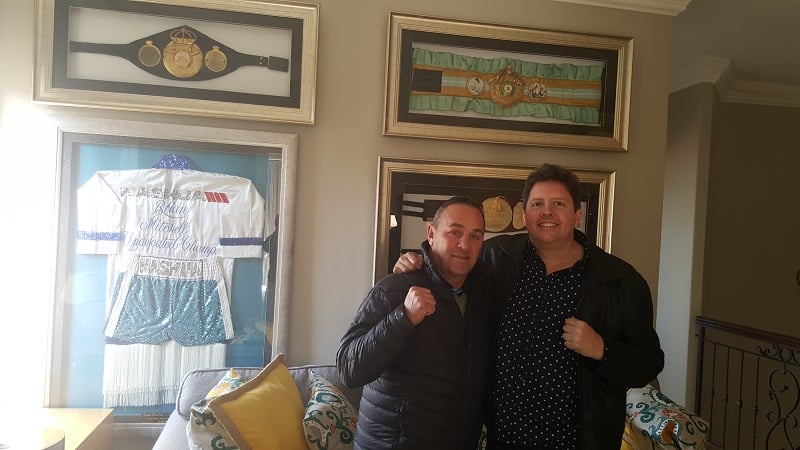
Former two-time junior lightweight titleholder Brian Mitchell (left) and Droeks Malan
Mitchell’s only loss came against local rival, Jacob Morake, a loss which he avenged three times. Their fourth encounter ended in Morake being fatally injured. Mitchell was known more as a fighter who would outbox you or wear you down with an accumulation of punches, rather than a knockout artist. I ask whether the Morake tragedy affected his punching power, “No, I don’t think so. The level (of opponents) gets tougher. I was knocking guys out in the beginning but there is no way you are going to knock out a Tony Lopez. You start fighting more scientifically.”
When Mitchell was titlist, there was a lot of local hype and media rivalry between him and Dingaan Thobela, who would become WBO and WBA lightweight and even WBC super middleweight beltholder much later in his career and I have to ask about it, “It was his promoter, Thinus Strydom, not him. They rode on my back to get publicity. I was at the end of my career. I was a junior lightweight and he was a lightweight. Then they concocted a story that I turned down a million rand (about $67,668 USD today) offer to face him. There was never such an offer. That angered me. I didn’t mind them riding on my back but don’t make up stories for the press.” I have to ask how a fight between them would have gone down. Mitchell fixes my eyes with his and asks, “What do you think?” I reply that Thobela was a real talent but blew hot and cold and I would have had to favor his consistency. “He would have had a puncher’s chance but I always beat the punchers,” he shrugs.
We move on to his lengthy title reign. Mitchell rates Jose Rivera as the best puncher he has fought. The pair fought twice. The first encounter was a draw in the maiden defense of his title in the challenger’s backyard of Puerto Rico. They later fought a second time in the more neutral location of Madrid and, this time, Mitchell schooled him. “Joe Rivera knocked me down twice (once in both fights with a left hook). He threw nasty, hard shots.” Who was the best Mitchell’s fought? The answer is predictable: “Tony Lopez was the best I’ve fought, by far. He was a great fighter; he beat many world champions.”
I ask him whether the draw in their first encounter wasn’t perhaps a blessing in disguise. “You could have been robbed blind. The draw gave you the rematch and you got paid twice.” He nods in agreement but adds that the emotions were different at the time, “I was angry. I wanted both titles and, on the night, I thought I shaded it. I gave him a bit too much respect and lost some early rounds. Nowadays I would say that you have to win all the rounds because you never know when you might need them. I’m OK with it now. It was a close fight. There were other draws in my career that were worse. Where they really tried to rob me was the first fight with Rivera. Let’s say I didn’t get the draw and they gave it to him, I would have lost the title in my first defense. It would have changed my life. I can’t complain about my career.”
The rematch followed and, this time, Mitchell clearly out boxed his favored rival over 12 rounds, “A thing most people don’t know was that Lopez never made the weight. We were both battling. I had to drop two kilos on the day of the fight and eventually made the weight. He was still over. They wanted to make it a non-title fight for less money and, of course, I wasn’t going to do that and they let it slide.”
We touch on today’s day-before weigh-ins, as opposed to the same-day weigh-ins that he had in many of his fights. Mitchell seems to be a modernist, “Give the guys a chance to put liquid into their system. Health-wise (day before), it is better. Even when it comes to fighting 15 rounds, I’m fine with the way it is now. I liked 15 rounds but some guys got hurt in those last rounds.”
I question the reasoning behind Mitchell’s first retirement. He was undefeated as champion and still only 30 years old. On paper at least, there were still intriguing fights to be made against Azumah Nelson, Jeff Fenech and John John Molina, “Actually the first retirement was going to happen after I beat Frankie Mitchell in my 11th title defense. It was a tough fight. He was undefeated at the time and he came to win. I decided to retire after that. The unification fights weren’t happening and I had nothing left to do in boxing. I took a holiday and even had a few beers for the first time in 15 years. I was sitting on Clifton Beach when Rodney called and said, ‘Whatever you are doing, get back in the gym. I got something big for you.’ It was the unification fight with Lopez for my biggest payday yet.
“After that I thought, ‘I’m never going back to Sacramento’ but then HBO wanted the rematch and it was too much money to turn down. I won. I was 30 and my career worked out great. I didn’t want to be a steppingstone and retired.”
When questioned about his brief comeback a few years later, Mitchell admits it was strictly for the money. “We were going out one night and I joked with Rodney and told him, ‘If you give me a million, I’ll fight again.’ Next day he calls me up and asks, ‘Were you serious?’ I said, ’Were you serious?’ and so I did it.” As a junior welter, I felt fine at 33. I was more muscular and stronger but I started getting hit with punches I would not have gotten hit with before.” That fact made him decide to hang them up for good. Mitchell is grateful for his career. “I wouldn’t have changed anything if I had my life over.”
Like all boxing fans, I can’t resist playing the “could have, would have” game and threw the names of Azumah Nelson, Jeff Fenech and John John Molina out there.
The mention of Nelson gets him excited, “I would have loved to test myself against him because most people rated him higher than me. I liked to fight punchers. I guess he would have had a puncher’s chance but, then again, I fought many punchers and they couldn’t knock me out, so why would he? It would have been a very tough fight but I would have outsmarted him. That fight never happened because of Don King. He only opened his arms to South Africa when Nelson Mandela became president.”
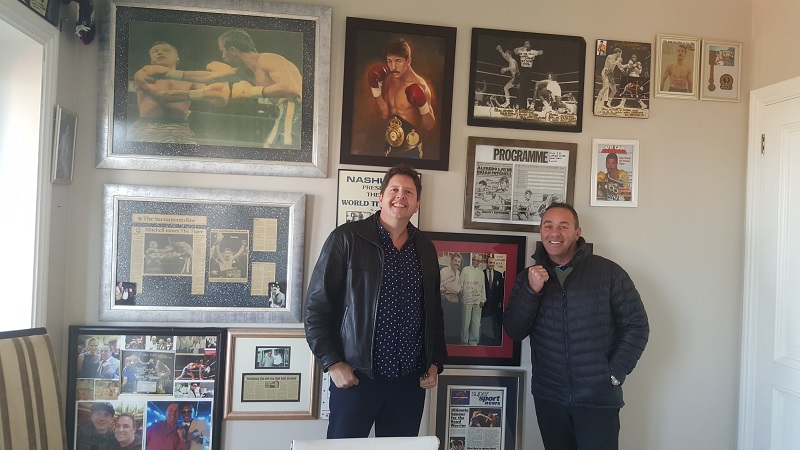
Former two-time junior lightweight titleholder Brian Mitchell (right) and Droeks Malan
Fenech? “He may have been a bit easier to figure out but also very tough. It would still have been a grueling fight. I liked fighting guys that came to me. It was difficult for me if I had to chase them down.”
I propose that Molina may have been the most difficult stylistic matchup. “Difficult, yes, but you still could hit him. I think I would have beaten him.”
Refreshingly there are some other fighters, even though they only had brief stays at his weight, whom he would have liked to fight without necessarily fancying his chances. “(Floyd) Mayweather (Jr.),” he enthuses. “Maybe he would have beaten me, such a great defense. You just couldn’t hit him. I would have given him a run for his money but I can’t say I would have beaten him. I also think Julio Cesar Chavez (Sr.)might have beaten me up. At his best, he was great.”
Patience reminds MItchell of his appointment on the golf course and we have to wrap things up. I question him about what I thought was a bit of an urban legend. Turns out it was true.
“Yes,” he admits. “I was in Australia with a mate of mine from one of my sponsors. This guy was 6-foot-6 but not a fighter at all. We were there to support the Springboks (the national Rugby team) against the Aussies.” They went out on the town wearing their supporters’ jerseys and some locals wouldn’t leave them alone, going on and on about beating them up. “Eventually I told the guy with the loudest mouth to shut it or I’m coming over. He still wouldn’t stop, so we got out of our seats and went over. Then he looks at my friend and says, ‘No, no, not you. We want the little guy.’” The unfortunate soul took a swing and the champ “gave him a little left hook.” That was the end of the argument.
“It’s not something I would normally do. The guy just went too far. It doesn’t happen over here. In SA, the respect is there. It is really great to see that the fans still remember me. I’m still loving life at 58.”
I say my goodbyes and leave him to his golf.
And yes, all these years later, Brian Mitchell is still cool.
Struggling to locate a copy of The Ring Magazine? Try here or
Subscribe
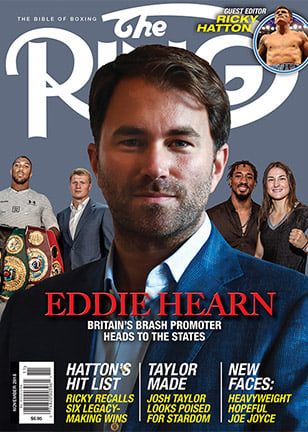
You can order the current issue, which is on newsstands, or back issues from our subscribe page.







